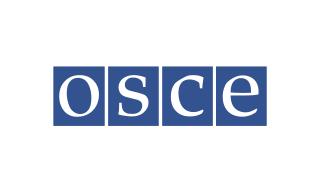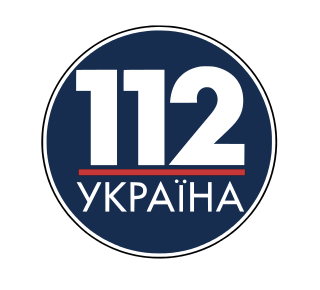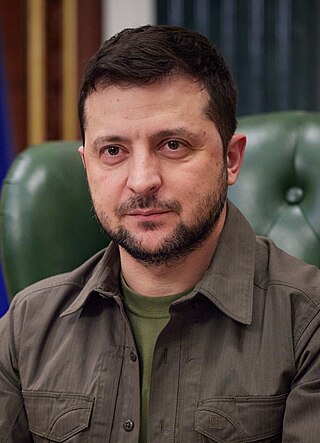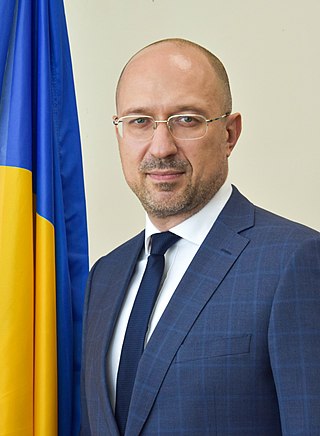
The Organization for Security and Co-operation in Europe (OSCE) is a regional security-oriented intergovernmental organization comprising member states in Europe, North America, and Asia. Its mandate includes issues such as arms control, the promotion of human rights, freedom of the press, and free and fair elections. It employs around 3,460 people, mostly in its field operations but also in its secretariat in Vienna, Austria, and its institutions. It has observer status at the United Nations.

The Party of Regions is a banned pro-Russian political party in Ukraine formed in late 1997 that became the largest party in Ukraine between 2006 and 2014.
The 2008 Ukrainian political crisis started after President Viktor Yushchenko's Our Ukraine–People's Self-Defense Bloc (NU-NS) withdrew from the governing coalition following a vote on a bill to limit the President's powers in which the Prime Minister's Bloc Yulia Tymoshenko (BYuT) voted with the opposition Party of Regions. The bill would have required the consent of the Prime Minister for the appointment and dismissal of the Prosecutor General by the President, given the government power to appoint local heads of government if the President rejects the candidates, stripped from the President the right to reject a candidate for Prime Minister, dismiss the Defense, Interior and Foreign Ministers, and appoint a head of the State Intelligence Service. President Yushchenko stated that a clear position on the 2008 Russo-Georgian War was one of the conditions under which return to talks in the Parliament was possible, as well as the repeal of all the constitutional laws adopted after 3 September. Yushchenko claimed that a "de-facto coalition" was formed with 'no other aims but to conduct coup d'état and usurp power in the country'. Tymoshenko stated that the real intentions behind the President's party in 'declaring war on her' was to ensure his victory in the next presidential election, although she still called for a reformation of the coalition between the two parties. She also reiterated her position on the Georgian conflict, claiming to be neutral and more in line with the European Union.

The Office of the President of Ukraine is a standing advisory body set up by the President of Ukraine pursuant to clause 28, Article 106 of the Constitution of Ukraine. The Office consists of the Head of the Office of the President of Ukraine, Deputies of the Head, Chief of Staff, First Assistant to the President, Advisors, Authorized Advisors, Press Secretary, Representatives of the President, Cabinet of the President, Cabinet of the Head of the Office, Services, Directorates, and Departments.
The Center for Policy Studies in Ukraine is a non-governmental think tank in Ukraine, headquartered in Lviv. The Center deals with international politics, civil society, NGOs, education, politics, regional policy and legislature; it also conducts conferences and seminars. The Center for Policy Studies was established in 1994 and officially registered in 1997. One of its key objectives is to utilize the creative potential of the graduates and students of social sciences and humanities at Lviv University and other universities in Lviv and the region to promote democratic principles and civil society in Ukraine. The center works to assist the development of a network of teaching staff and innovative educational areas, and to implement activities aimed at developing professional, independent media to document the changing political environment of Ukraine.
The International Centre for Policy Studies (ICPS) is an independent NGO, founded in 1994 which aims to promote public policy concepts and practice and apply them to influential policy research that affects both the public and private sectors in Ukraine.
The International Renaissance Foundation (IRF) is a Ukrainian NGO founded by George Soros. It was founded in April 1990. IRF is an integral part of the Open Society Foundations which incorporates national and regional foundations in more than thirty countries around the world, primarily in Central and Eastern Europe, as well as the former Soviet Union. These foundations share a common goal of supporting educational, social and legal initiatives that promote the development and establishment of an open society.

Arsen Borysovych Avakov is a Ukrainian statesman and politician of Armenian origin. Minister of Internal Affairs of Ukraine in 2014–2021. Member of Parliament of Ukraine (2012–2014), Chairman of the Kharkiv Regional State Administration (2005–2010), Member of the National Security and Defense Council of Ukraine, Member of Euro 2012 Organizing Committee (2007). Member of the National Union of Journalists of Ukraine. Honored Economist of Ukraine (2007).
Language policy in Ukraine is based on its Constitution, international treaties and on domestic legislation. According to article 10 of the Constitution, Ukrainian is the official language of Ukraine, and the state shall ensure the comprehensive development and functioning of the Ukrainian language in all spheres of social life throughout the entire territory of the country. Some minority languages have significantly less protection, and have restrictions on their public usage.

Revival is a political party in Ukraine, established in its current form in June 2015. Its predecessor had been founded by Heorhiy Kirpa in 2004.

In Ukraine, lustration refers to the removal from public office of civil servants who served under Ukrainian President Viktor Yanukovych. This measure was initiated under president Petro Poroshenko, after Yanukovich was deposed in the Revolution of Dignity. This lustration also applies to civil servants who were active in the Communist Party of the Soviet Union prior to 1991. A 2019 proposal by the newly elected president Volodymyr Zelensky proposed to expand the lustration to the officials who served under Poroshenko, citing the dissatisfaction many Ukrainians felt with Ukraine’s largely ineffective bureaucracy by the time Poroshenko’s presidential term ended. The proposal attracted much more criticism, including international criticism, than the first round of lustration (2014), both because Poroshenko peacefully turned over power to Zelensky as well as the belief held amongst many Ukrainians that Poroshenko’s presidency was much less corrupt than Yanukovych’s. Nonetheless, the ECHR’s ruling has important implications for future such programs. A week after the proposal, a member of Zelensky’s Servant of the People party proposed to end the policy of lustration. By 2020, lustration had been argued to be relatively successful in purging much of Ukraine’s previous corrupt bureaucracy, as well as purging pro-Russian officials who served under President Yanukovych. However, it was also argued to be somewhat of a failure in that many representatives of Yanukovych’s Party of Regions remained with political influence, although as the political opposition in Ukraine, and instead now named the “Opposition Bloc”. Amidst the Russo-Ukrainian War, in 2022 the Opposition Bloc, along with other pro-Russian parties, were banned, resulting in lustration being close to completion.

112 Ukraine was a private Ukrainian TV channel which provided 24-hour news coverage. 112 Ukraine was available on satellites AMOS 2/3, via the DVB-T2 network, and was also available in packages of all major Ukrainian cable operators until it was banned from broadcasting in Ukraine in February 2021. The channel was focused on live broadcasting.

The European Union Anti-Corruption Initiative, EUACI, is the largest program of technical assistance in fighting corruption in Ukraine implemented by the European Union.

Volodymyr Oleksandrovych Zelenskyy is a Ukrainian politician and former actor who has been serving as the sixth president of Ukraine since 2019.

Andrii Pavlovych Zahorodniuk is a Ukrainian entrepreneur and politician. From 2015 to 2017, Zahorodniuk headed the Reform Project Office at the Ministry of Defense of Ukraine. He was the Minister of Defence of Ukraine from 29 August 2019 to 4 March 2020.

Yelyzaveta Oleksiyivna Yasko is a Ukrainian politician, cultural affairs expert and film producer.

The Shmyhal government is the current government of Ukraine, formed on 4 March 2020 and led by Denys Shmyhal, who was previously serving as Deputy Prime Minister in the Honcharuk government, and the Governor of Ivano-Frankivsk Oblast.

Zagoriy Foundation is a Ukrainian charitable foundation that develops the culture of charitable giving in Ukraine and provides support to non-profit organizations. Other areas of the Foundation's operation are educational and research projects aimed at improving the efficiency of the charity sector.

The Ukrainian Institute is a public institution of Ukraine that represents Ukrainian culture in the world and forms a positive image of Ukraine abroad. The institute was founded by the Cabinet of Ministers of Ukraine in 2017 and is affiliated with the Ministry of Foreign Affairs of Ukraine. It fully began its activities in the summer of 2018, after the appointment to the position of General Director Volodymyr Sheiko, as a result of an open competition and the creation of a team of specialists.

Media Center Ukraine is a civic initiative that, after the start of the full-scale Russian invasion, united media professionals, the government, and the business community with a shared goal of telling the world about the war in Ukraine. The Media Center aims to provide specialist support and advice to media representatives covering events in Ukraine and develop communication strategies and campaigns. Also, the Media Center offers a platform for organizing and hosting top newsworthy events.















